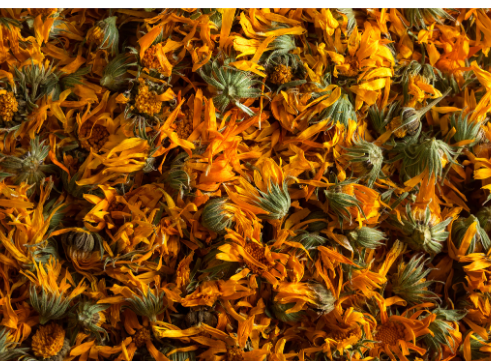Calendula
Calendula, scientifically known as Calendula officinalis, is a vibrant, yellow to orange flowering plant that belongs to the Asteraceae family. Often referred to as “marigold,” calendula is widely recognized for its beauty, but it is also highly valued for its numerous therapeutic properties. With a long history of use in herbal medicine, calendula is renowned for its healing abilities, especially when it comes to skin health and inflammation.
Nutritional Components of Calendula
Calendula flowers contain a variety of beneficial compounds, including flavonoids, saponins, carotenoids, and essential oils. These compounds contribute to its anti-inflammatory, antimicrobial, and antioxidant properties. Calendula is also rich in vitamins, particularly Vitamin C, which plays a key role in boosting the immune system and supporting skin health.
types
Calendula arvensis
Calendula alba
Calendula solivifera
Calendula stellata
Benefits
Skin Health and Healing
خصائص مضادة للالتهابات
Antimicrobial and Antiseptic Effects
Digestive Health
Boosting Immune Function
Anti-cancer Potential
Ways to Use Calendula
Topical Use: Calendula is most commonly used in the form of creams, ointments, oils, or salves applied directly to the skin. It can help treat minor cuts, burns, rashes, and other skin irritations.
Calendula Tea: Calendula can be made into a soothing herbal tea by steeping dried flowers in hot water. This tea is beneficial for digestive health and can help with inflammation or irritation in the throat.
Tinctures and Extracts: Calendula tinctures or liquid extracts are commonly used as a natural remedy for various conditions. They can be used to treat digestive issues, promote healing, or reduce inflammation.
Baths: Adding calendula to a warm bath can help relieve skin conditions such as eczema or sunburn, as well as promote relaxation.
Medicinally Used Part
The bright orange flowers of calendula are used in traditional medicine, as they contain active compounds that help in treating inflammation and promoting wound healing. Calendula flower extracts are also widely used in cosmetics and skincare products.
Cultivation Methods
Soil Preparation
Calendula thrives in well-drained soil rich in organic matter.
It is recommended to plow the land and add organic fertilizers to improve soil fertility.
Seed Planting
Seeds are sown directly into the soil at a depth of 1-2 cm.
Plants should be spaced 30-40 cm apart to ensure healthy growth.
Irrigation
The soil should be kept moist but not overwatered.
Avoid extreme dryness to maintain plant health.
Planting Season
Calendula is best planted in the spring, when moderate temperatures support optimal growth.
Export details to all parts of the world
Types: Flowers or petals
Weight: As per client request
Weight, packing, and filling: Automated
Origin: Egypt
Packing: Bags or cartons

Calendula petals


اترك تعليقاً